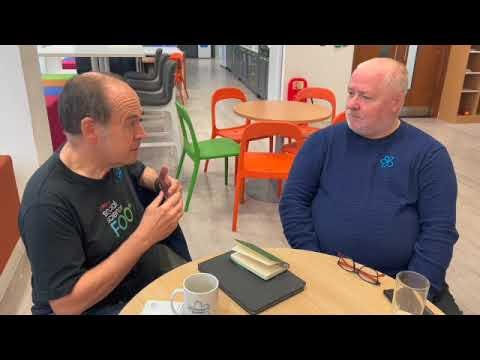The Longitude Prize - new hope for people with dementia
Hunt for smart ideas to help people live better for longer
Today sees the launch of a bold attempt to improve the lives of people with dementia. The Longitude Prize will offer a total of £4.3 million for innovative ideas that can help people with early stage dementia to live independently for longer.
Dementia is a condition which afflicts millions, including members of my own family. So when I was asked to help promote the prize by the Alzheimer’s Society, which along with Innovate UK and Challenge Works is running the competition, I was delighted to be involved.
The charity invited me and Eamonn Dobbyn to its headquarters in the City of London to discuss the prize and what technology could do to improve lives. Eamonn, now 59, was diagnosed three years ago with early onset dementia - or as he explained it to me. “temporal frontal lobe dementia, and also cordial basal disintegration.”
If I had a stereotypical view of dementia Eamonn certainly did not fit it. He had made his own way on public transport from his home in Surrey to central London and he was a lively and articulate conversationalist. But he says he does have symptoms, both mental and physical: “My mobility is quite impaired - but also my short term memory. I can remember certain things - I remember watching the television last night, and what programme it was. But I couldn't tell you what the story was because I can't remember that.”
As an enthusiastic technology user Eamonn is excited about the Longitude Prize. He already uses an Amazon Alexa device to remind him when to get up and when to take his medication and his Android smartphone keeps him up to date with his email and appointments. An activity wristband counts his steps and reminds him to keep drinking water - dehydration is often a danger for people with dementia.
But his pride and joy is another wristband called the Tap2Tag:
“It's got all my medical information on it - it can be accessed by the police, fire brigade or the ambulance should I've been involved in an accident. It's got full medication history, full medical history, so it saves time. And also contact details with my doctor and my carer.”
As for the Longitude Prize, Eamonn has a clear idea of the innovations he’d like to see: “I would like it to make people be able to stay in their house longer when they've been diagnosed.” And he stresses that’s all about making technology more accessible: “The younger generation can understand technology a lot better than myself. The older generation really do struggle, so it really does need thinking about, making it user friendly.”
The prize involves a four year process with £3.34 million being given first as seed capital to get promising ideas off the ground, before an overall winner is chosen to receive £1 million in 2026.
Kate Lee, the CEO of the Alzheimer’s Society, says its research shows that people feel that technology could play a crucial part in helping them live the lives they want. But she says until now it has mainly focused on monitoring people with dementia to keep them safe - the prize will seek out ideas that go further: “There are huge opportunities to harness cutting-edge technology to help fill in the gaps in their brain and thinking as their condition progresses.” She says facial recognition is one example: “We could repurpose the software of TikTok and WhatsApp to help people put a name to a face or remember a word.”
The charity’s head of innovation Simon Lord, who runs its accelerator programme, is hoping ideas emerge that allow people with dementia to keep on doing things that make them happy for longer: “See the people they want to see, maintain social connections, and doing it all in a way where the solution continues to adapt and compensate as the condition progresses, effectively providing them with a kind of a longer term safety net.”
The Longitude Prize, which echoes the 18th century bounty for finding a way of pinpointing a ship’s location at sea, was revived in 2014. The first challenge was to find ways of addressing the problem of antibiotic resistance. That contest, with an overall prize of £8 million, is still underway. The deadline for submitting entries has been extended from 2020 to the end of this month.
That idea of dealing with antibiotic resistance was the winner among six potential challenges in a BBC viewers’ poll. Now helping people with dementia live independently for longer, another of the six choices, is the next challenge.
Eamonn Dobbyn hopes that, as well as generating some good ideas, the Longitude Prize will help change attitudes to people with dementia:
“There's a lot of stigma with it, it’s something that needs addressing,” he says. “We've got so much left to give. Although we have problems with short term memory and things like that, don't wrap us in cotton wool, there’s so much we can do for you. We can educate you on how to communicate and how to deal with people with young onset, therefore make their life much more better.”
To find out more and enter the Longitude Prize on Dementia, go to dementia.longitudeprize.org. Entries close on 26 January 2023.


